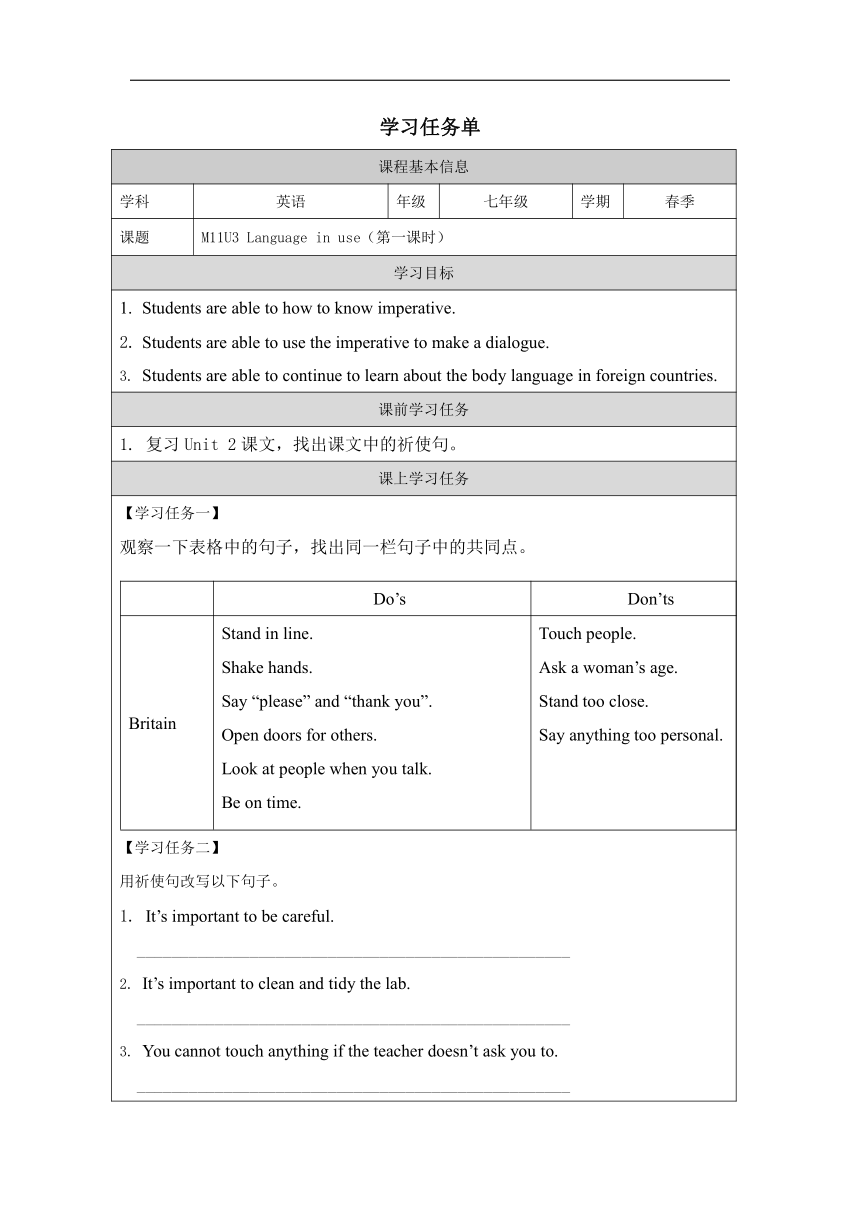
学习任务单 课程基本信息 学科 英语 年级 七年级 学期 春季 课题 M11U3 Language in use(第一课时) 学习目标 Students are able to how to know imperative. Students are able to use the imperative to make a dialogue. Students are able to continue to learn about the body language in foreign countries. 课前学习任务 1. 复习Unit 2课文,找出课文中的祈使句。 课上学习任务 Do’sDon’tsBritainStand in line. Shake hands. Say “please” and “thank you”. Open doors for others. Look at people when you talk. Be on time.Touch people. Ask a woman’s age. Stand too close. Say anything too personal. 【学习任务一】 观察一下表格中的句子,找出同一栏句子中的共同点。 【学习任务二】 用祈使句改写以下句子。 It’s important to be careful. _____ It’s important to clean and tidy the lab. _____ You cannot touch anything if the teacher doesn’t ask you to. _____ You cannot bring food or drink into the lab. _____ You cannot enter the lab alone. _____ 推荐的学习资源 【知识梳理】 祈使句是表示命令、要求、警告、劝告、禁止、建议、鼓励、请求等语气的句子。其主语常为第二人称且常常省略(Let’s ... 除外)。在祈使句中,为了缓和语气,使表达更委婉、有礼貌,常常在句首或句末加上please。 在英语口语中,当祈使句用来表达命令、要求时,用降调;当祈使句用来表达鼓励、请求,或者想使语气委婉一些,让人容易接受时,通常用升调。 【祈使句的句式】 肯定式1.动词原形(+ 宾语)+ 其他成分. 2.Be + 表语(名词或形容词)+ 其他成分. 3.Let’s + 动词原形 + 其他成分.Pass me the salt please. 请把盐递给我。 Be careful not to fall down! 小心别摔倒! Let’s go out to dinner. 我们出去吃晚饭吧。 否定式1.Don’t/Never + 动词原形(+ 宾语)+ 其他成分. 2.Don’t/Never + be + 表语(名词或形容词)+ 其他成分. 3.No+名词 / 动词-ing Never say that again. 决不要再说起那件事。 Don’t be so rude! 别这么粗鲁! NO PHOTOS! No parking! 注意: 祈使句+and/or+含有一般将来时的陈述句. 该句型中and 表示前后句是顺接关系,意思是“那么”;or 表示前后句是转折关系,意思是“否则”。 祈使句可以转换为if引导的条件状语从句,但这时要去掉连词and/or。. 例①:Take more exercise and you’ll become healthy. =If you take more exercise, you’ll become healthy. 多锻炼,你就会身体健康。 例②:Hurry up, or you will be late for school. =If you hurry up, you won’t be late for school. =If you don’t hurry up, you will be late for school. Let's ( let sb ) + not + 动词原形 Let's not say anything about it. 对于这件事,咱们什么也别说。 Let them not play with fire. 别让他们玩火。 祈使句的反意疑问句 (1) 肯定祈使句的反意疑问句反问部分用will you 或won't you。 Please open the door, will/ won’t you 请把门打开,好吗? (2) 否定祈使句的反意疑问句反问部分只用will you。 Don't be late again, will you 别再迟到了,行不行? (3) 以let's开头的祈使句反意疑问句反问部分用shall we。 Let's turn on the TV, shall we 我们把电视打开,好吗? <特别注意> 只有以let's开头的祈使句的反意疑问句的反问部分才用shall we,而let us 开头的祈使句的反意疑问句的反问部分应为will you或won't you. 如:Let us stay here, will/ won't you 请(你)让我们留在这好吗? ... ...
~~ 您好,已阅读到文档的结尾了 ~~

